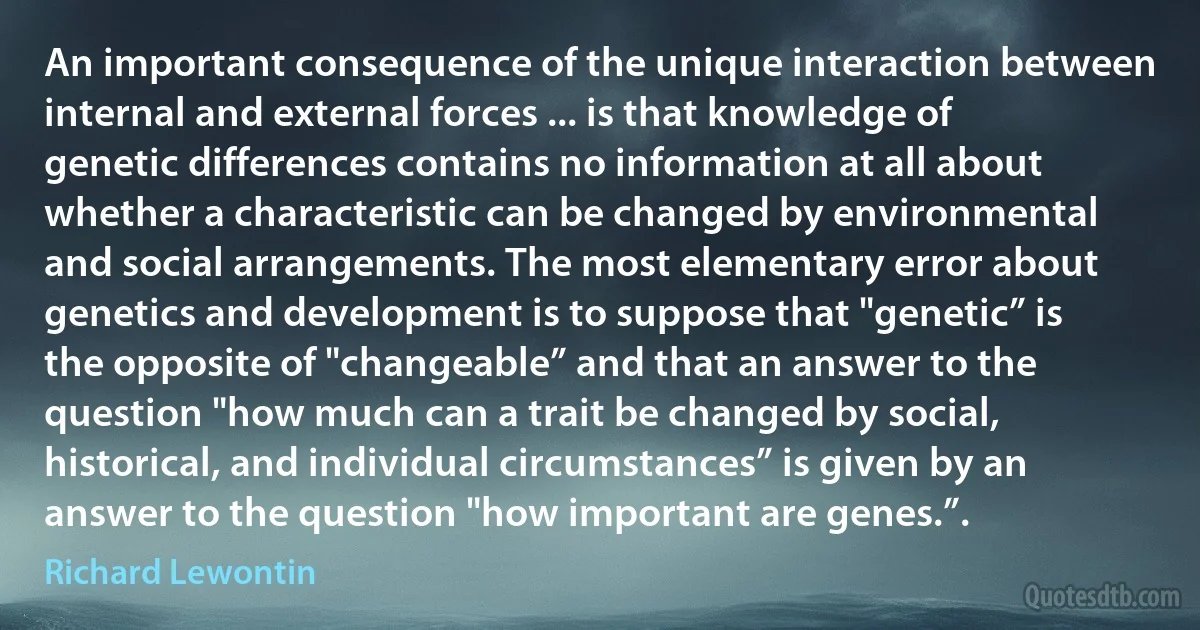
An important consequence of the unique interaction between internal and external forces ... is that knowledge of genetic differences contains no information at all about whether a characteristic can be changed by environmental and social arrangements. The most elementary error about genetics and development is to suppose that "genetic” is the opposite of "changeable” and that an answer to the question "how much can a trait be changed by social, historical, and individual circumstances” is given by an answer to the question "how important are genes.”.
Richard LewontinRelated topics
answer characteristic development elementary error given historical interaction knowledge question suppose trait unique circumstances geneticsRelated quotes
The social dynamics of human history, even more than that of biological evolution, illustrate the fundamental principle of ecological evolution - that everything depends on everything else. The nine elements that we have described in societal evolution of the three families of phenotypes - the phyla of things, organizations and people, the genetic bases in knowledge operating through energy and materials to produce phenotypes, and the three bonding relations of threat, integration and exchange - all interact on each other.

Kenneth Boulding
It is clear, then, that the idea of a fixed method, or of a fixed theory or rationality, rests on too naive a view of man and his social surroundings. To those who look at the rich material provided by history, and who are not intent on impoverishing it in order to please their lower instincts, their craving for intellectual security in the form of clarity, precision, "objectivity", "truth", it will become clear that there is only one principle that can be defended under all circumstances and in all stages of human development. It is the principle: anything goes.

Paul Karl Feyerabend
It is therefore, the interest of all, that every one, from birth, should be well educated, physically and mentally, that society may be improved in its character, - that everyone should be beneficially employed, physically and mentally, that the greatest amount of wealth may be created, and knowledge attained, - that everyone should be placed in the midst of those external circumstances that will produce the greatest number of pleasurable sensations, through the longest life, that man may be made truly intelligent, moral and happy, and be thus prepared to enter upon the coming Millennium.

Robert Owen
Modern man, seeking a middle position in the evaluation of sense impression and thought, can, following Plato, interpret the process of understanding nature as a correspondence, that is, a coming into congruence of pre-existing images of the human psyche with external objects and their behaviour. Modern man, of course, unlike Plato, looks on the pre-existent original images also as not invariable, but as relative to the development of a conscious point of view, so that the word "dialectic" which Plato is fond of using may be applied to the process of development of human knowledge.

Wolfgang Pauli
History teaches us that a given view has been abandoned in favor of another by all men, or by all competent men, or perhaps by only the most vocal men; it does not teach us whether the change was sound or whether the rejected view deserved to be rejected. Only an impartial analysis of the view in question, an analysis that is not dazzled by the victory or stunned by the defeat of the adherents of the view concerned-could teach us anything regarding the worth of the view and hence regarding the meaning of the historical change.

Leo Strauss
